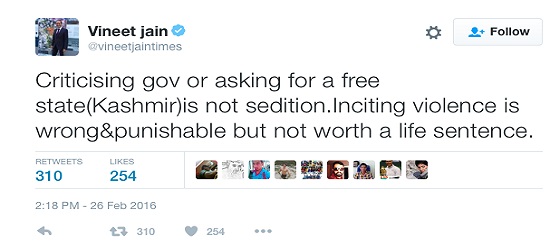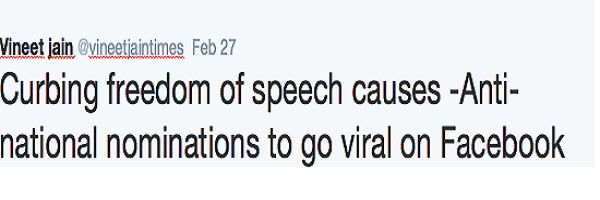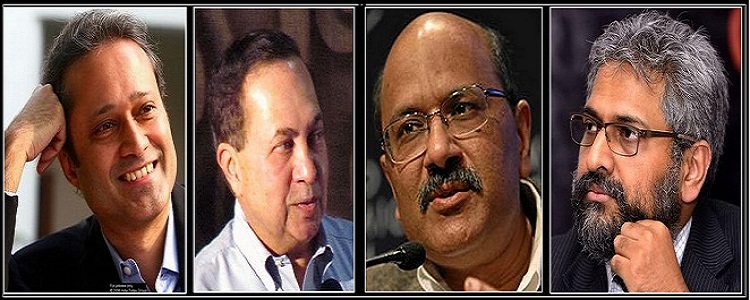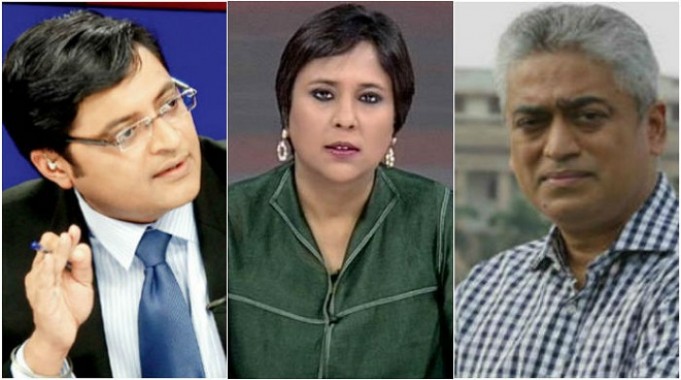On journalism and patriotism

Late in February, when the Kanhaiya Kumar agitation at Delhi’s Jawaharlal Nehru University (JNU) was at its peak and Times Now editor-anchor Arnab Goswami was fulminating about JNU students allegedly shouting slogans pro-“azaadi” in Kashmir, Times of India group managing director Vineet Jain had this to say on Twitter :
“Criticising gov or asking for a free state (Kashmir) is not sedition. Inciting violence is wrong & punishable but not worth a life sentence,” he said.
Now it’s a fair assumption that @vineetjaintimes pays Mr Goswami’s salary. More to the point, the Times of India proprietor believes in putting his money where his mouth is. Only a day after his Kashmir tweet in February, Mr Jain tweeted a TOI story on “anti-nationalism,” saying,

Which is why when Mr Goswami made his now-infamous remarks about putting journalists on trial because they dared to report “anti-national” occurrences like the usage of CRPF’s pellet guns blinding Kashmiri protestors in the wake of Burhan Wani’s death last month, Mr Jain allowed him his right to differ.
Here is what Arnab Goswami said, on July 26, on @TimesNow :
"I say not bringing them (people who are pro-Pakistan) to trial compromises my country further, and I don't care if some of these people are in the media. Bring them to trial too."
In all the hyper-patriotic sighing and heaving that Indian journalism has been witness over the decades, this was certainly a new low. Those who recall the Emergency years ---when the then Jan Sangh leader L K Advani said when the media was asked to bend asked the media to bend it infamously crawled --- point out that the Indian media has since been trying to prove its independence.
Of course, the media was so busy sucking up to the powers-that-be during the Emergency years that it wasn’t attacking its fellow journalists – Goswami’s comments stand out for this reason too.
Predictably, his comments have kicked up a real fuss. @NDTV consulting editor Barkha Dutt slammed Goswami on Facebook saying she felt ashamed at belonging to the same industry as him. Another star-anchor Rajdeep Sardesai, refused to join issue, saying both Barkha and Arnab were former colleagues and that he would rather do a Michelle Obama and ignore the argument.
But he ended his column with the admission, “by calling for media 'gags' and seeking vigilante justice against dissenting voices, Arnab has let down the Indian media and chipped away at its freedoms.”

Pix credit, left to right: Vineet Jain (Twitter.com), N Ram (Wikipedia), Shekhar Gupta (Wikipedia) and Siddharth Varadarajan (Twitter.com)
Not that Ms Dutt was giving up. In another column, this time for NDTV, she insisted that she was simply rejecting the “sinister intimidation tactics of a classic bully and his subversion of journalism,” namely Goswami’s daily rant that passes off for journalism every evening.
“The worst response however belongs to those who have positioned this as a personal squabble in which they will not take "sides". Take sides? This is not a messy divorce in which friends want to keep relationships intact with both partners,” she said, targeting Mr Sardesai’s refusal to get dragged into the freedom-of-speech controversy.
Certainly, Arnab Goswami has the right to say what he likes – after all, in a state which guarantees freedom of speech and expression, he has the freedom to speak on behalf of the establishment, even when the establishment disagrees with him. Not since the Emergency, in fact, has any political party dared to suggest that the media should in any way be gagged or silenced even when the so-called “national interest” is at stake.
But what is “national interest,” asked N Ram, chairman of Kasturi and Sons Ltd, publishers of The Hindu. “Those who shout loudly about patriotism are clearly indulging in a kind of chauvinism….love of land is good, but don’t proclaim it from the housetops. Moreover, to question other people’s patriotism is shameful…” he told ‘The Hoot.’
“Patriotism is an all embracing concept, your country right or wrong….but that doesn’t mean that governments are always right, or that we must believe in governments right or wrong. Journalists must have the right to ask questions,” Mr Ram said.
Both Shekhar Gupta, former editor of the Indian Express and the moving spirit behind @ThePrint and Siddharth Varadarajan, former editor of The Hindu and founder editor of the web portal, @thewire_in, pointed out that Goswami should reread his Constitution as there was no law in the country under which you could be tried for the views that you hold.
“I have total disagreements, for example, with the Arundhati Roy view on Kashmir, and frankly think she is a headline-hunter, but find nothing illegal or dangerous to the national interest,” Mr Gupta said.
Mr Varadarajan pointed out : “Journalists have a duty to act in the public interest and not become appendages or mouthpieces or spokespersons of the state… Goswami needs to understand that the nation, i.e. its people, are more important than those who claim to act or speak on behalf of the nation.
It’s completely wrong, said Mr Ram, for Arnab to “instigate authorities to prosecute journalists for their views on such a major question. Its perfectly legitimate for journalists to look critically at Kashmir and express their views freely.”
Varadarajan expressed surprise that journalists were attacking fellow professionals. “This is the first time I have seen a journalist so wedded to the establishment that he feels the need to target other journalists on behalf of the government,” he said.
@TimesNow reporters point out that Arnab Goswami doesn’t care about the left-leaning or liberal commentary that occasionally attacks him and his show – including by some of India’s top journalists above -- because he is so way and above the market leader that he is free to ignore them.
While that is perfectly true, it may be worth his while for Goswami to follow his own paymaster @vineetjaintimes. It’s always a good idea to know what the bosses, and not necessarily those in government, are thinking.
